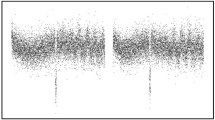Abstract
The search of planets capable of sustaining life has been taken to a whole new level with NASA’s Kepler mission. The mission has successfully discovered around 4000 planets, however, the task of manual evaluation of this data is cumbersome and labor intensive, and calls for more efficient methods of discovering exoplanets to remove false positives and errors. The goal of this project is to utilize machine learning algorithms to classify stars as exoplanets through the data collected by the Kepler satellite. To this end, we plan to use preprocessing methods and apply suitable classification algorithms to build an accurate and optimal classifier, increasing the proficiency of the process.
All authors contributed equally.
Access this chapter
Tax calculation will be finalised at checkout
Purchases are for personal use only
Similar content being viewed by others
References
Cortes C, Vapnik VN (1995) Support-vector networks. Mach Learn 20(3):273–297. CiteSeerX 10.1.1.15.9362. https://doi.org/10.1007/BF00994018. S2CID 206787478.
Khanchi I et al, Automated framework for real-time sentiment analysis. In: International conference on next generation computing technologies (NGCT-2019).
Kshitiz K et al (2017) Detecting hate speech and insults on social commentary using nlp and machine learning. Int J Eng Technol Sci Res 4(12):279–285
Choudhury T, Kumar V, Nigam D, Mandal B (2016) Intelligent classification of lung & oral cancer through diverse data mining algorithms. In: 2016 International conference on micro-electronics and telecommunication engineering (ICMETE). IEEE, pp 133–138
Mittal V, Gupta S, Choudhury T (2018) Comparative analysis of authentication and access control protocols against malicious attacks in wireless sensor networks. In: Satapathy S, Bhateja V, Das S (eds) Smart computing and informatics. Smart innovation, systems and technologies, vol 78. Springer, Singapore. https://doi.org/10.1007/978-981-10-5547-8_27
Agarwal A, Gupta S, Choudhury T (2018) Continuous and integrated software development using DevOps. In: 2018 International conference on advances in computing and communication engineering (ICACCE), 2018, pp 290–293. https://doi.org/10.1109/ICACCE.2018.8458052
Ahlawat P et al (2020) Sensors based smart healthcare framework using internet of things (IoT). Int J Sci Technol Res 9(2):1228–1234
Taneja S et al (2019) I-Doctor: An IoT based self patient’s health monitoring system. In: 2019 International conference on innovative sustainable computational technologies, CISCT 2019
Pearson KA, Palafox L, Griffith CA (2018) Searching for exoplanets using artificial intelligence, Monthly Notices of the Royal Astronomical Society, vol 474, issue 1, pp 478–491. https://doi.org/10.1093/mnras/stx2761
Armstrong DJ, Pollacco D, Santerne A (2017) Transit shapes and self-organizing maps as a tool for ranking planetary candidates: application to Kepler and K2. Mon Not R Astron Soc 465(3):2634–2642. https://doi.org/10.1093/mnras/stw2881
Author information
Authors and Affiliations
Corresponding authors
Editor information
Editors and Affiliations
Rights and permissions
Copyright information
© 2023 The Author(s), under exclusive license to Springer Nature Singapore Pte Ltd.
About this paper
Cite this paper
Sharma, H.K., Singh, B.K., Choudhury, T., Mohanty, S.N. (2023). PCA-Based Machine Learning Approach for Exoplanet Detection. In: Reddy, K.A., Devi, B.R., George, B., Raju, K.S., Sellathurai, M. (eds) Proceedings of Fourth International Conference on Computer and Communication Technologies. Lecture Notes in Networks and Systems, vol 606. Springer, Singapore. https://doi.org/10.1007/978-981-19-8563-8_44
Download citation
DOI: https://doi.org/10.1007/978-981-19-8563-8_44
Published:
Publisher Name: Springer, Singapore
Print ISBN: 978-981-19-8562-1
Online ISBN: 978-981-19-8563-8
eBook Packages: Intelligent Technologies and RoboticsIntelligent Technologies and Robotics (R0)




